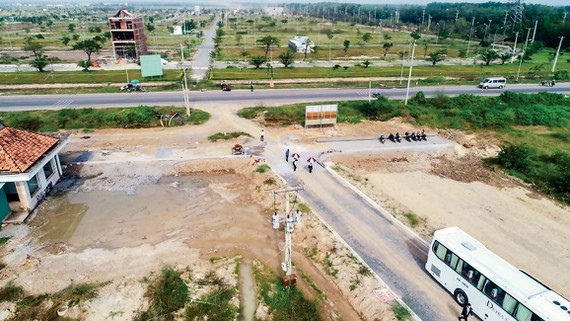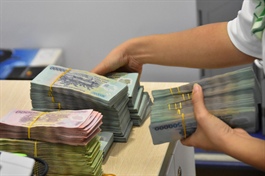State budget revenue increase unsustainable
State budget revenue increase unsustainable
Although the state budget revenue in 2021 exceeded the annual estimate, it is still not enough to convince the tax authorities. When the income structure is unstable and long term, the actual state budget revenue gradually decreases.
Illustrative photo. |
Budget increase a paradox
According to the Ministry of Finance, the accumulated total state budget revenue in the first 11 months of 2021 was estimated at VND 1,180,000 bn, equal to 107.5% of the 2020 estimate. In this, some large revenue such as that of state-owned enterprises is estimated at 101.6%; foreign invested enterprises are estimated at 99.5%; revenue from the non-state sector is estimated at 107.8%; personal income tax is estimated at 107.7%; land use fee is estimated at 121.5%; and land rent is estimated at 125.9%. Therefore, if we look at the revenue structure, we will see that the revenue from land such as from land tax and land sales, accounts to a very large proportion.
Mr. Ho Duc Phuoc, Finance Minister of Vietnam, informed the National Assembly that the state budget revenue in 2021 will increase because of sporadic revenue, such as arrears in Formosa contract tax collection, handling the difference in gas prices in product consumption, or especially revenue of nearly VND 3,000 bn from land rent of the United States Embassy.
In fact, sudden revenue increase did not only happen in the last quarter of 2021. Looking at the budget revenue structure in 2021, this can be seen clearly. For example, rising commodity prices starting from the beginning of the third quarter led to an increase in tax revenue and some fees; also some revenue sources benefitted from fiscal and monetary policies in 2020; and from some hot growth industries such as banking, securities, real estate, automobile manufacturing, and assembly lines. In this, the most significant was credit growth and capital mobilization in 2020, which contributed to helping banks increase profits, leading to the fourth quarter of 2020 see an increase by about VND 4,500 bn.
In addition, many real estate projects were transferred at the end of 2020, but financial obligations to the state budget were fulfilled only by early 2021, which resulted in a sudden increase in corporate income tax revenue from real estate transfers of about VND 6,000 bn. Besides this, after the severe effects of the Covid-19 pandemic from 2020 onwards, the merger and acquisition (M&A) market was quite active with mergers, consolidation, and revaluation of assets on capital contribution or capital transfer increases, resulting in sudden increase in corporate income tax.
The budget revenue in the first 11 months of 2021 increased abnormally because the 2021 estimate did not reflect reality. Specifically, the estimation of state budget revenue in 2021 is based on the revenue of the first nine months of 2020 and the forecast for the whole of 2020. At that time, the Ministry of Finance forecast that the state budget in 2020 will suffer a huge revenue loss of nearly VND 180,000 bn due to the serious impact of the Covid-19 pandemic, natural disasters, storms, and floods, so it has also made a modest revenue estimate for 2021. Therefore, the results of the 11 months of 2021 compared to the same period in 2020 have increased compared to the estimate. Generally speaking, the State budget revenues are still modest, if not on the verge of a sharp decline.
Unsustainable revenue
In the last five years, the structure of budget revenue has shifted to increasing the proportion of domestic revenue. If in the period 2011 until 2015, the average rate of domestic revenue was 68.7%, by 2020 the proportion of domestic revenue reached 85.4%. On the other hand, the proportion of revenue from import and export activities reduced according to the tariff reduction schedule in order to open up the market for goods and services.
However, there is a reality that has been worrying many people for several years now. That is the structure of budget revenue, even domestic revenue of Vietnam, which is currently unreasonable, precarious, and unsustainable. While the source of income is not guaranteed, expenditure must still be maintained at a high level of which recurrent spending is still at the top, and a persistently prolonged budget deficit is inevitable.
Currently, the state budget is still dependent on a number of sources of income such as land, crude oil, import and export activities, and resource exploitation, fields that are highly dependent on international market fluctuation. These are not only exhausting natural resources as well as labor and financial resources but are also making the state budget revenue structure unsustainable. It is time to look to other more stable and sustainable sources of income.
For instance, the tax sector still has room for improvement in the revenue structure. A research report on tax structure conducted by Vietnam Institute for Economic and Policy Research (VEPR), shows that the growth rate of tax revenue is equivalent to the growth rate of GDP. Since 2011, Vietnam's tax-to-GDP ratio has been stable at 18%. The share of direct taxes has been steadily decreasing and this has partly reduced the progress of the Vietnamese tax system.
Corporate income tax currently accounts for a large proportion, but currently it is on a downward trend. The trend of reducing corporate tax revenue did not appear when the Covid-19 pandemic broke out initially, but the main reason for its application was that the Government began applying more and more tax incentives to the business sector, especially to Foreign Direct Investment (FDI) enterprises. Besides, currently the proportion of income tax collection in Vietnam is still low. In particular, personal income tax has grown strongly but still makes a modest contribution to the total State budget revenue.
According to finance experts, tax authorities can absolutely raise the tax rate on personal income tax and also increase the progressive tax rate compared to the current one, while at the same time strengthen control to avoid loss of revenue.




















